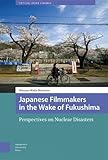Japanese Filmmakers in the Wake of Fukushima : Perspectives on Nuclear Disasters / Mitsuyo Wada-Marciano.
Material type: TextSeries: Critical Asian Cinemas ; 4Publisher: Amsterdam : Amsterdam University Press, [2023]Copyright date: ©2023Description: 1 online resource (250 p.)Content type:
TextSeries: Critical Asian Cinemas ; 4Publisher: Amsterdam : Amsterdam University Press, [2023]Copyright date: ©2023Description: 1 online resource (250 p.)Content type: - 9789048556885
- Fukushima Nuclear Disaster, Japan, 2011, in motion pictures
- Motion picture producers and directors -- Japan -- Interviews
- Motion pictures -- Japan -- History -- 21st century
- Art and Material Culture
- East Asia and North East Asia
- Film Studies
- Film, Media, and Communication
- Media Studies
- ART / Film & Video
- JJapanese documentary films, atomic cinema, the nuclear disaster in Fukushima, contemporary Japanese arts, nuclear power
- 791.430952 23
- PN1993.5.J3 W3274 2023
- online - DeGruyter
| Item type | Current library | Call number | URL | Status | Notes | Barcode | |
|---|---|---|---|---|---|---|---|
 eBook
eBook
|
Biblioteca "Angelicum" Pont. Univ. S.Tommaso d'Aquino Nuvola online | online - DeGruyter (Browse shelf(Opens below)) | Online access | Not for loan (Accesso limitato) | Accesso per gli utenti autorizzati / Access for authorized users | (dgr)9789048556885 |
Frontmatter -- Table of Contents -- List of Illustrations -- Acknowledgements -- Introduction -- 1. No Nukes before Fukushima : Postwar Atomic Cinema and the History of the “Safety Myth” -- 2. Straddling 3/11: The Political Power of Ashes to Honey -- 3. Resistance against the Nuclear Village -- 4. The Power of Interviews -- 5. Learning about Fukushima from the Margins -- 6. The Power of Art in the Post-3/11 World -- Appendix: Interview from “Film Workshop with Director Hamaguchi Ryusuke” -- Bibliography -- Index
restricted access online access with authorization star
http://purl.org/coar/access_right/c_16ec
n the ongoing aftermath of the nuclear accident in 2011, filmmakers have continued to issue warnings about the state of Japanese society and politics, which remain mired in refusal to change. Nearly a decade in the making, Japanese Filmmakers in the Wake of Fukushima is based on in-person interviews with countless filmmakers, as well as continuous dialogue with them and their work. Author Wada-Marciano has expanded these dialogues to include students, audiences at screenings, critics, and researchers, and her observations are based on down-to-earth-exchange of ideas engaged in over a long period of time. Filmmakers and artists are in the vanguard of those who grapple with what should be done regarding the struggle against fear of the invisible blight—radiation exposure. Rather than blindly following the mass media and public opinion, they have chosen to think and act independently. While repeatedly viewing and reviewing the film works from the post-Fukushima period, Wada-Marciano felt the unwavering message that emanates from them: “There must be no more nuclear weapons.” “There must be no more nuclear power generation.” The book is dedicated to convincing readers of the clarity of their message.
Mode of access: Internet via World Wide Web.
In English.
Description based on online resource; title from PDF title page (publisher's Web site, viewed 06. Mrz 2024)


